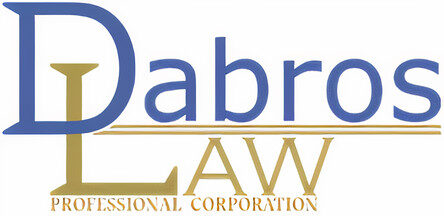Guardianship Application
When an individual over the age of 18 becomes mentally incapable of making their own decisions, applying for guardianship is a way to protect this vulnerable person when it comes to financial decisions, real estate, bills, or decisions regarding their health and overall well-being. Guardianship application grants you legalized authority as a substitute decision maker to execute well-informed decisions on behalf of the mentally incapable individual or loved one. Of the financial and health-related categories, the type of decisions a guardian is allowed to make will depend on which type of application is completed.


Types of Guardianship
There are two positions of appointment when it comes to guardianship application and it’s not always necessary to seek both. If you’re unsure which application is needed for your situation, you can reach out to the experts at Dabros Law. We can recommend the best course of action based on your situation.
Guardians of Property are responsible for managing and making decisions related to the mentally incapable person’s property. Real estate decisions, financial accounts, making purchases, selling assets, handling investments, managing pensions, and paying bills, all fall under this type of guardianship. These decisions must be done in a way that maximizes that person’s quality of life. A guardian of property has no say regarding personal matters like living situations, medical situations, and so forth.
Guardians of Personal Care are responsible for personal care decisions for the mentally incapable individual. This can include making decisions related to health care, living arrangements, medical procedures, nutrition, clothing, safety, hygiene, etc. Much like with Guardians of property, these decisions must also be executed in the person’s best interest.
Difference Between a Power of Attorney and Guardian
At Dabros Law, we offer legal advice and services for both power of attorney situations as well as guardianship applications. Both of these positions can seem similar, but depending on your situation it’s good to know the difference between the two. A power of attorney is appointed by someone who is still mentally capable. They will appoint someone to look after their finances in the event of mental incapacity. Whereas a guardian of property (or personal care) is appointed after someone has become mentally incapable. This situation typically occurs when they neglected to appoint a power of attorney while they were of sound mind. Much like guardianships, there are also two types of power of attorney (personal care and property) and the duties are essentially the same. The main difference between these two positions is the way in which an individual was appointed.


Apply For Guardianship With Dabros Law
Guardianship application can take several months so it’s best to get the process started right away to ensure your loved one is well taken care of. A guardian of property is appointed by the Ontario Superior Court of Justice or the Office of Public Guardian and Trustee (OPGT). As for becoming a guardian of personal care, the only way to do this is by applying to court. For any guardianship applications, a law firm should be consulted. We can help guide you through the process when it comes to decision-making, application, record-keeping, and answering any questions you may have.

